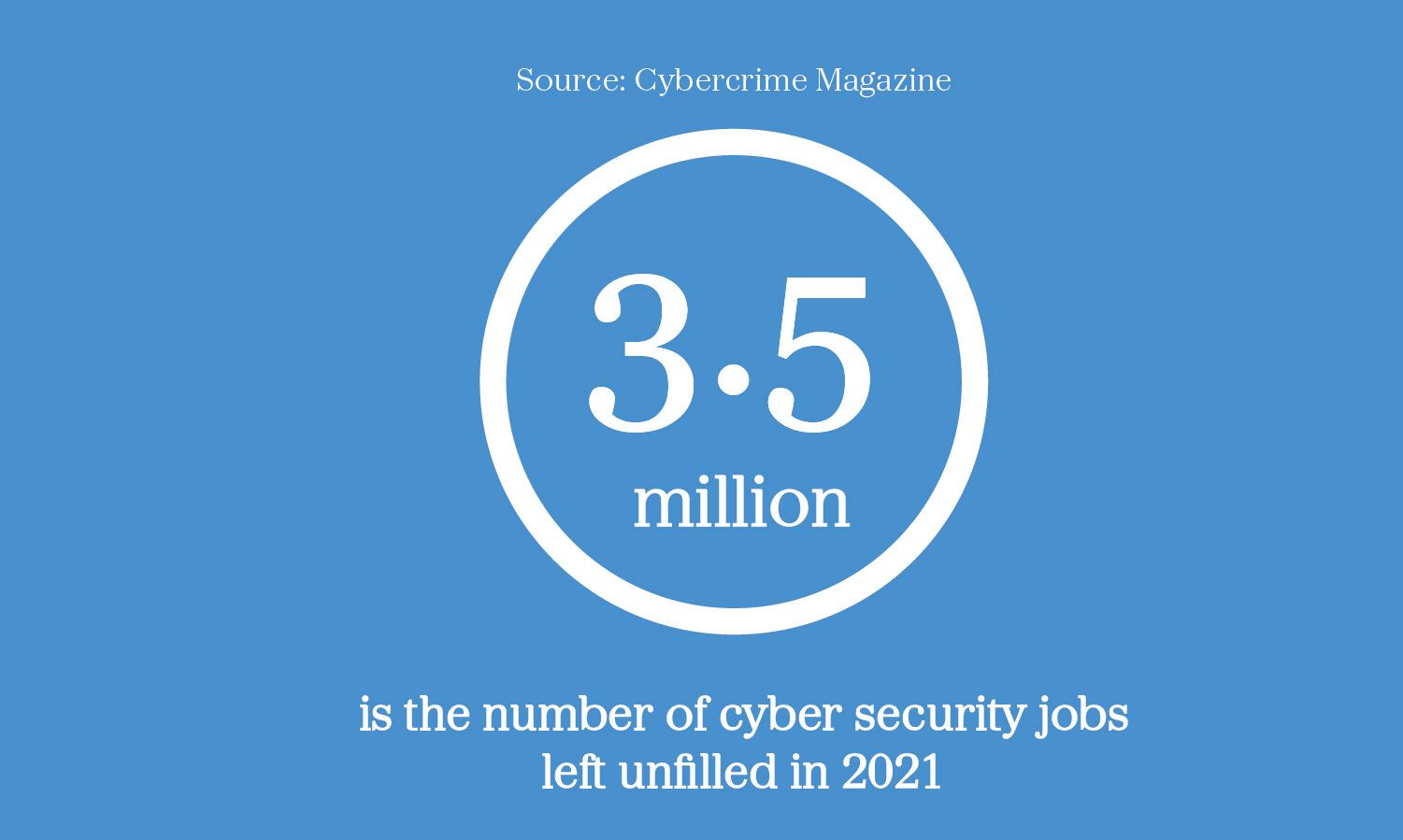Hire, train, deploy - brave new hiring strategies to face a brave new world
Contributors:
Dr. Kiki Leutner, Lecturer, Goldsmiths University of London
Michelle Hainsworth, Managing Director, AMS

The Great Resignation has created an unprecedented wave of global employee turnover, with severe shortages in certain job roles leading to fierce competition for the best talent.
In the US, nearly four million Americans quit their jobs each month in 2021 according to the Bureau of Labor Statistics, with job openings at a historic high. As of December last year, there were just under two open positions for every unemployed person in the United States.
One area that is particularly oversubscribed is tech talent, with digital transformation brought about by the pandemic further driving demand. Amazon announced plans to hire 55,000 new people in the US and Facebook needs another 10,000 European tech employees to build out its Metaverse proposition. And yet there isn’t enough talent to go around. Germany alone needs to hire 780,000 tech specialists by 2026 to meet current requirements, while nearly 3.5 million cyber security jobs were left unfilled in 2021.
However, there is another sector facing huge talent shortages and bottlenecks in hiring people - and that’s recruiters, the very industry at the centre of solving the talent crunch brought about by the Great Resignation.
A dearth of talent
August 2021, there were more recruiter jobs advertised on LinkedIn than software engineer roles (364,970 to 342,586), with a 6.8 increase in recruiter jobs posted between June 2020 and June 2021. The data also suggests that hiring managers are increasingly swimming in the same talent pool when it comes to recruiter talent, with 59% of hires coming from a previous recruiting role, compared with 33% pre-pandemic.
Why? This is partly due to the number of talent professionals who were laid off during the pandemic coming back into new roles, but it’s also likely that the current hiring frenzy is seeing organisations stick to experienced recruiters who require less training, driving even fiercer competition.
As LinkedIn’s senior director of talent acquisition Erin Scruggs puts it: “Most of our new hires are coming from competitive offer situations where they were interviewing elsewhere and working with other companies’ recruiters.”
Making recruitment more representative
It is clear there is a significant and ongoing skills gap across all sectors including the talent space. Organisations that recruit inhouse are desperate to fill their talent needs while at the same time recruiters’ salaries are continuing to rise though there has been some softening here in recent months.
To help organisations meet this demand, AMS has launched Recruiter Skilling as part of the AMS Talent Lab offering, a new solution that helps businesses to build their inhouse recruitment teams by both identifying and hiring potential applicants, then provides expert training to ensure they succeed.
AMS provides applicants with ten weeks training in how to be a recruiter including a two week client specific training program to learn about their specific employee value proposition, culture, and systems. Once completed, the trainee works in the client environment but remains an AMS employee, who provide ongoing training and mentoring. The ultimate aim is for the individual to roll into the client’s inhouse recruitment team, becoming a permanent employee.
For AMS, one of the main aims of the programme is to open up recruitment to a more diverse field of people such as veterans and their spouses, older workers, returnees, people from different socio-economic backgrounds and varying minority groups. With this in mind, to become a successful future recruiter greater emphasis should be given to soft skills such as adaptability, business acumen, agility, and empathy.
In today’s ever changing world of work, it is imperative for a recruiter to demonstrate these core skills. Firstly, it importantly ensures recruitment teams are more representative of the people they are aiming to attract and ultimately hire, and secondly, the skills needed to sell a job are changing. And changing fast. More and more employees say they will only consider companies that have a purpose that resonates with their own values and belief systems. Policies around mental health and wellbeing as well as DE&I and sustainability / ESG activities are mattering more and more. Recruiters need to be able to sell a job, and be empathetic too. As a result, there is a new wave of recruiters coming in with a different skillset who will be able to close candidates more effectively and at pace.








The Great Resignation has created an unprecedented wave of global employee turnover, with severe shortages in certain job roles leading to fierce competition for the best talent.
In the US, nearly four million Americans quit their jobs each month in 2021 according to the Bureau of Labor Statistics, with job openings at a historic high. As of December last year, there were just under two open positions for every unemployed person in the United States.
One area that is particularly oversubscribed is tech talent, with digital transformation brought about by the pandemic further driving demand. Amazon announced plans to hire 55,000 new people in the US and Facebook needs another 10,000 European tech employees to build out its Metaverse proposition. And yet there isn’t enough talent to go around. Germany alone needs to hire 780,000 tech specialists by 2026 to meet current requirements, while nearly 3.5 million cyber security jobs were left unfilled in 2021.

However, there is another sector facing huge talent shortages and bottlenecks in hiring people - and that’s recruiters, the very industry at the centre of solving the talent crunch brought about by the Great Resignation.
A dearth of talent
In August 2021, there were more recruiter jobs advertised on LinkedIn than software engineer roles (364,970 to 342,586), with a 6.8 increase in recruiter jobs posted between June 2020 and June 2021. The data also suggests that hiring managers are increasingly swimming in the same talent pool when it comes to recruiter talent, with 59% of hires coming from a previous recruiting role, compared with 33% pre-pandemic.
Why? This is partly due to the number of talent professionals who were laid off during the pandemic coming back into new roles, but it’s also likely that the current hiring frenzy is seeing organisations stick to experienced recruiters who require less training, driving even fiercer competition.
As LinkedIn’s senior director of talent acquisition Erin Scruggs puts it: “Most of our new hires are coming from competitive offer situations where they were interviewing elsewhere and working with other companies’ recruiters.”
Making recruitment more representative
It is clear there is a significant and ongoing skills gap across all sectors including the talent space. Organisations that recruit inhouse are desperate to fill their talent needs while at the same time recruiters’ salaries are continuing to rise though there has been some softening here in recent months.
To help organisations meet this demand, AMS has launched Recruiter Skilling as part of the AMS Talent Lab offering, a new solution that helps businesses to build their inhouse recruitment teams by both identifying and hiring potential applicants, then provides expert training to ensure they succeed.
AMS provides applicants with ten weeks training in how to be a recruiter including a two week client specific training program to learn about their specific employee value proposition, culture, and systems. Once completed, the trainee works in the client environment but remains an AMS employee, who provide ongoing training and mentoring. The ultimate aim is for the individual to roll into the client’s inhouse recruitment team, becoming a permanent employee.
For AMS, one of the main aims of the programme is to open up recruitment to a more diverse field of people such as veterans and their spouses, older workers, returnees, people from different socio-economic backgrounds and varying minority groups. With this in mind, to become a successful future recruiter greater emphasis should be given to soft skills such as adaptability, business acumen, agility, and empathy.
In today’s ever changing world of work, it is imperative for a recruiter to demonstrate these core skills. Firstly, it importantly ensures recruitment teams are more representative of the people they are aiming to attract and ultimately hire, and secondly, the skills needed to sell a job are changing. And changing fast. More and more employees say they will only consider companies that have a purpose that resonates with their own values and belief systems. Policies around mental health and wellbeing as well as DE&I and sustainability / ESG activities are mattering more and more. Recruiters need to be able to sell a job, and be empathetic too. As a result, there is a new wave of recruiters coming in with a different skillset who will be able to close candidates more effectively and at pace.

Future skills
A recent Josh Bersin post entitled The Definitive Guide to Recruitment: Human-Centred Talent Acquisition looked at the skills a modern recruiter requires by surveying 600 companies. It suggests that recruiters need to move away from technical knowledge of job roles to softer, more rounded skills like collaboration, branding, and employee experience, ‘personalising candidate experiences’, ‘building authentic marketing to appeal to top talent’ and ‘flexing with changing business needs’. The modern recruitment professional is a strategic ally and influencer on business goals, it suggests.
Bersin’s research also advocates the use of technology to strengthen talent pipelines, though he admits most companies remain in the dark about how to effectively do so. Nevertheless, his research suggests that technology can drive key metrics.
“Companies that employ AI throughout their recruitment processes are four times more likely to boast a strong candidate pipeline. Likewise, those that leverage a variety of digital hiring solutions like online assessments, virtual interview platforms and pre-hire chatbots, are twice as likely to be able to attract and recruit the right talent,” he writes.
Dr Kiki Leutner is a lecturer in occupational psychology at Goldsmiths College, University of London and co-author of The future of recruitment: using the new science of talent analytics to get your recruitment right.
Like Bersin, she believes that technology can drive huge efficiencies in the recruitment process - and that the near universal use of video interviews during and post-COVID shows recruiters can adapt easily.
“There are two key benefits to recruitment technology in the post-COVID era. One is time to hire. You can communicate with candidates and hire much quicker using automated text messages, standardised online processes and game-based assessments.
The second is ease of application for candidates. When applicants have lots of opportunities to choose from, you lose them when you put them through hours of in-person testing or don’t respond promptly,” she says.
Strategic data analysis
Another important outcome from technology is the opportunity to reduce bias in recruiting, whether through gamified testing which is less stressful and more inclusive than panel interviews, or through machine learning aimed at removing human bias in selection processes.
“We’re seeing more companies use analytics in their video interviews or applicant tracking systems. If you have a platform all applicants go through, you can compare data to ask, ‘are we more diverse in applicants this year?’ The main goal is to get recruiters thinking about hiring in a data driven way,” she says.
This is a challenge that some are meeting better than others. “We still have a mindset where hiring managers think they are the best judge of character. Whether unconsciously or consciously, they still want to recruit the same mould of people,” says Michelle Hainsworth, managing director, for Tech Skilling at AMS Talent Lab.
Like the Recruiter Skilling programme, Tech Skilling takes individuals with adjacent skills and retrains them into new tech roles, before placing them with clients. Again, the aim is to diversify the sector and solve skill shortages, which has seen demand sky rocket.
“Recently I’ve heard a lot about candidates ghosting. They have so much choice that they don’t even bother to tell you they’re not turning up on day one after they’ve accepted the job. They’re getting multiple offers and buy-back from existing employers,” says Hainsworth.
The solution isn’t simply offering higher salaries, although they are yet to slow down. Rather, says Hainsworth, it’s also about organisations offering purpose at work, development opportunities and work/life balance - and recruiters knowing how to sell this. Candidate engagement and experience has never been more important.
“Wellbeing, mental health, social and corporate responsibility - all these things are becoming more important to people. I don’t think that those organisations that simply have a pay strategy will win people back long-term.
“It’s not just about getting people through the door, it’s about what you do after that,” adds Hainsworth.
Recruiters might be the first line of attack in getting talent through the door, but increasingly, they also have a part to play in keeping your best talent with you. Developing the skills needed to do so means looking beyond traditional recruiter profiles and developing a more rounded talent acquisition team. It’s time to be brave.
written by the Catalyst Editorial Board
with contributions from:
Dr. Kiki Leutner
Lecturer, Goldsmiths University of London
Michelle Hainsworth
Managing Director, AMS








Future skills
A recent Josh Bersin post entitled The Definitive Guide to Recruitment: Human-Centred Talent Acquisition looked at the skills a modern recruiter requires by surveying 600 companies. It suggests that recruiters need to move away from technical knowledge of job roles to softer, more rounded skills like collaboration, branding, and employee experience, ‘personalising candidate experiences’, ‘building authentic marketing to appeal to top talent’ and ‘flexing with changing business needs’. The modern recruitment professional is a strategic ally and influencer on business goals, it suggests.
Bersin’s research also advocates the use of technology to strengthen talent pipelines, though he admits most companies remain in the dark about how to effectively do so. Nevertheless, his research suggests that technology can drive key metrics.
“Companies that employ AI throughout their recruitment processes are four times more likely to boast a strong candidate pipeline. Likewise, those that leverage a variety of digital hiring solutions like online assessments, virtual interview platforms and pre-hire chatbots, are twice as likely to be able to attract and recruit the right talent,” he writes.
Dr Kiki Leutner is a lecturer in occupational psychology at Goldsmiths College, University of London and co-author of The future of recruitment: using the new science of talent analytics to get your recruitment right.
Like Bersin, she believes that technology can drive huge efficiencies in the recruitment process - and that the near universal use of video interviews during and post-COVID shows recruiters can adapt easily.
“There are two key benefits to recruitment technology in the post-COVID era. One is time to hire. You can communicate with candidates and hire much quicker using automated text messages, standardised online processes and game-based assessments.
The second is ease of application for candidates. When applicants have lots of opportunities to choose from, you lose them when you put them through hours of in-person testing or don’t respond promptly,” she says.
Strategic data analysis
Another important outcome from technology is the opportunity to reduce bias in recruiting, whether through gamified testing which is less stressful and more inclusive than panel interviews, or through machine learning aimed at removing human bias in selection processes.
“We’re seeing more companies use analytics in their video interviews or applicant tracking systems. If you have a platform all applicants go through, you can compare data to ask, ‘are we more diverse in applicants this year?’ The main goal is to get recruiters thinking about hiring in a data driven way,” she says.
This is a challenge that some are meeting better than others. “We still have a mindset where hiring managers think they are the best judge of character. Whether unconsciously or consciously, they still want to recruit the same mould of people,” says Michelle Hainsworth, managing director, for Tech Skilling at AMS Talent Lab.
Like the Recruiter Skilling programme, Tech Skilling takes individuals with adjacent skills and retrains them into new tech roles, before placing them with clients. Again, the aim is to diversify the sector and solve skill shortages, which has seen demand skyrocket.
“Recently I’ve heard a lot about candidates ghosting. They have so much choice that they don’t even bother to tell you they’re not turning up on day one after they’ve accepted the job. They’re getting multiple offers and buy-back from existing employers,” says Hainsworth.
The solution isn’t simply offering higher salaries, although they are yet to slow down. Rather, says Hainsworth, it’s also about organisations offering purpose at work, development opportunities and work/life balance - and recruiters knowing how to sell this. Candidate engagement and experience has never been more important.
“Wellbeing, mental health, social and corporate responsibility - all these things are becoming more important to people. I don’t think that those organisations that simply have a pay strategy will win people back long-term.
“It’s not just about getting people through the door, it’s about what you do after that,” adds Hainsworth.
Recruiters might be the first line of attack in getting talent through the door, but increasingly, they also have a part to play in keeping your best talent with you. Developing the skills needed to do so means looking beyond traditional recruiter profiles and developing a more rounded talent acquisition team. It’s time to be brave.
written by the Catalyst Editorial Board
with contributions from:
Dr. Kiki Leutner
Lecturer, Goldsmiths University of London
Michelle Hainsworth
Managing Director, Tech Skilling, AMS

